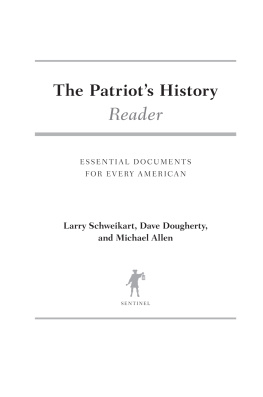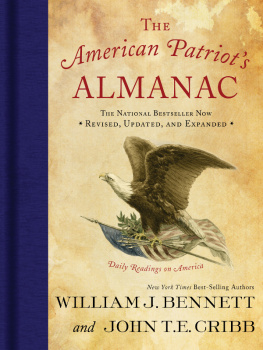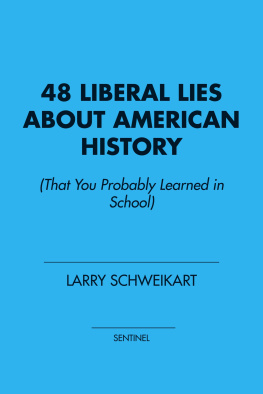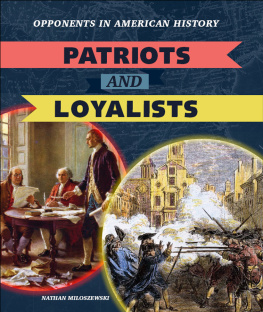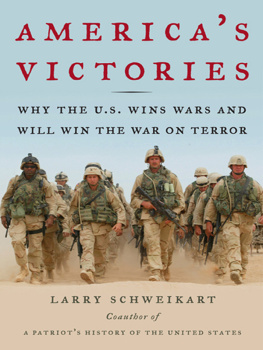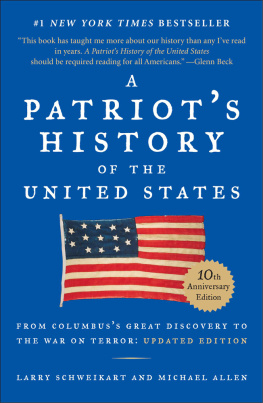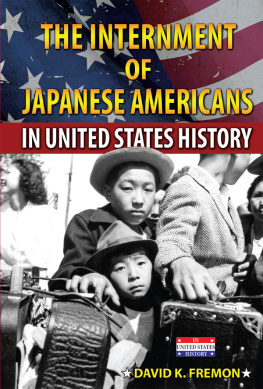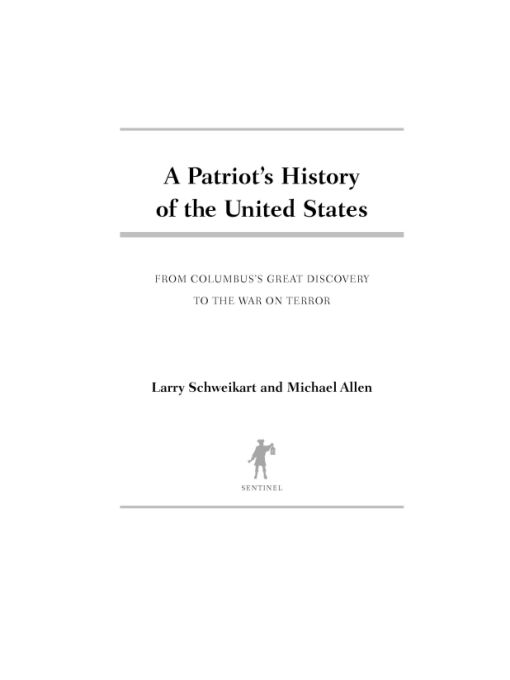Table of Contents
SENTINEL A PATRIOTS HISTORY OF THE UNITED STATES
Larry Schweikart is a professor of history at the University of Dayton. He has written more than twenty books on banking and financial history, business history, and national defense, including The Entrepreneurial Adventure (2000) and Americas Victories (2006). He lives in Springboro, Ohio, with his wife, Dee, and son, Adam.
Michael Allen, professor of history at the University of Washington, Tacoma, is the author of the prizewinning Western Rivermen, 1763-1861 (1990) and Rodeo Cowboys in the North American Imagination (1998). He lives in Tacoma and Ellensburg with his wife, Mary, and their children, Jim, Davy, and Caroline.
To Dee and Adam
Larry Schweikart
For my mom
Michael Allen
ACKNOWLEDGMENTS
Larry Schweikart would like to thank Jesse McIntyre and Aaron Sorrentino for their contribution to charts and graphs; and Julia Cupples, Brian Rogan, Andrew Gough, and Danielle Elam for research. Cynthia King performed heroic typing work on crash schedules. The University of Dayton, particularly Dean Paul Morman, supported this work through a number of grants.
Michael Allen would like to thank Bill Richardson, Director of Interdisciplinary Arts and Sciences at the University of Washington, Tacoma, for his friendship and collegial support for over a decade.
We would both like to thank Mark Smith, David Beito, Brad Birzer, Robert Loewenberg, Jeff Hanichen, David Horowitz, Jonathan Bean, Constantine Gutzman, Burton Folsom Jr., Julius Amin, and Michael Etchison for comments on the manuscript. Ed Knappman and the staff at New England Publishing Associates believed in this book from the beginning and have our undying gratitude. Our special thanks to Bernadette Malone, whose efforts made this possible; to Megan Casey for her sharp eye; and to David Freddoso for his ruthless, but much needed, pen. We are especially grateful to Clayton Cramer for a thorough reading of early printings that helped us correct important errors.
INTERVIEW WITH LARRY SCHWEIKART AS SEEN IN THE LIMBAUGH LETTER
I was delighted to speak with the eminent professor of history at the University of Dayton in Ohio and co-author of the seminal text A Patriots History of the United States, a book I highly recommend:
RUSH: Larry, how are you?
SCHWEIKART: Hi Rush, great to talk to you.
RUSH: Thank you for making time for us here, I appreciate it. Did using the word patriot in the title of your book get you into any trouble with your colleagues, not just in Dayton, but around the country?
SCHWEIKART: Not so far. Weve been lambasted on liberal websites, but the History News Network gave us a pretty balanced approach. First they had some article by the radical leftist historian Howard Zinn, and then they had an article I wrote, Why Its Time for a Patriots History of the United States. That used to be our subtitle. Our original title was, The Beacon of Liberty. Our publisher, Sentinel, was right on about this; they said, No, you have got to go with A Patriots History. Boy, that was a great call.
RUSH: What inspired you and Michael Allen to write the book?
SCHWEIKART: You know our environment; youve been talking about it for 15 years. The academy, as you well mentioned, is overwhelmingly left. We found, in looking at dozens and dozens of history textbooks, that they were overwhelming to the left. There wasnt one you could rely on to tell the story of Ronald Reagan, or to explain the damage done by the New Deal. That alone required us to write the book. As we went along, of course, we found a lot of other problems. But those were two of the most egregious errors that we found in all the books.
RUSH: It doesnt surprise me. How, historically, did it happen, that the American academy is basically anti-American in perspective? As you say there are exceptions to this all across the country, but it seems on balance that the desire is to portray the countrys history as negative.
SCHWEIKART: Exactly.
RUSH: The focus of evil in the modern world is the United States, and our Founders were evil, white slave owners. Has the academy always been this way, or is this relatively new? When did this shift begin?
SCHWEIKART: The academy always has been slightly left-leaning. But the real shift began at the end of the McCarthy era, when leftist professors were driven out, lost their jobs. At the end of that period, say the late 1950s, a lot of colleges went the other direction. To kind of make up for what they had done, they went so far the other direction that they started to welcome in leftists, especially in the social sciences, the arts, and history.
If you look at the 60s, you could have predicted those student riots just by noticing the three streams converging at that time. The first stream was usthe baby boomers. I am your age exactly. We had a bunch of kids coming of age around 1962, 63a whole generation of kids was coming into college at that time. The second stream was the money that came as a result of Sputnik; the federal government dumped millions and millions of dollars into the university systemsupposedly to go into engineering and math, but if you know anything about the way money works in the university, it doesnt stay where it is put. You know that from the athletic department: they bring in the money and then it goes everywhere throughout the campus. So this money ended up in the bigger departments, which were always the arts and sciences, and the liberal arts departments.
The third stream was these radical professors. My best take on it is that when these leftists came in, they were only a part of the department. But the people they were around were gentlemen and gentlewomen. They didnt believe in fighting, they didnt see all activities as political, and of course Marxists see everything as political. I knew a lot of these people. They just didnt want to fight these battles when these young liberals came in and took over. They took over the search committees, they started hiring more of their own. They started doling out money so it only rewarded radicals.
By the late 60s, most of the humanities, political science, sociology, were pretty much dominated by leftists. There were still some conservatives, but they had no power, they had no influence in the academy, and it was only a matter of time before they retired.
RUSH: Is there any hope? Here is your book, which stands out like a sore thumb. Do you see any potential shift? The reason I ask this is because I started my radio program in 1988, and in the 16-plus years since, the left wing has lost its monopoly in the media. The Democratic Party is imploding.
SCHWEIKART: Right. It is remarkable.
RUSH: There are a number of outposts still left, which I view as targets. And the overstuffed left wing of the academy seems to be one of them. Do you see any hopeful signs there?
SCHWEIKART: There are some signs. We do have a lot more conservative students than I have ever seen before. And there are a lot more students who are kind of middle-of-the-road, who are not interested in heavy ideology of any sort. They want to raise families, get their jobs, and they are especially put off by leftist propaganda. Youre right, we have witnessed an incredible shift in the media. Honestly, even when you started I didnt know wed ever get here. If you told me that CBS, ABC, and NBC would be fairly insignificant today, I would have said you are smoking something.


